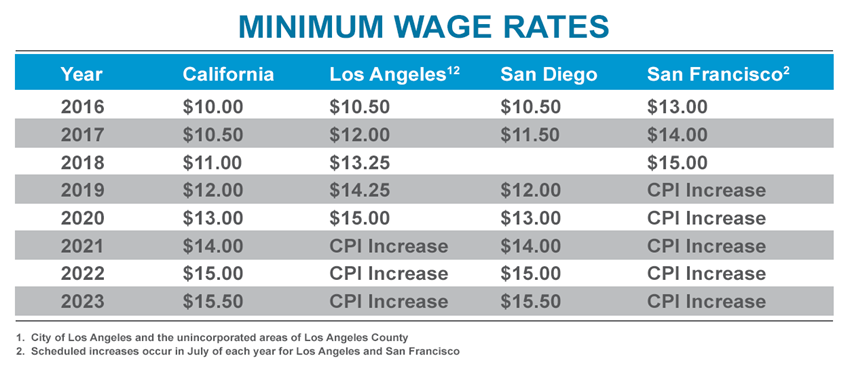How Will the Increase in Minimum Wage in California Impact Your HOA?

In April 2016, Gov. Jerry Brown signed into law a bill to raise the minimum wage in California. The new legislation (Senate Bill 3) gradually increased minimum wage from $10 an hour to $15 an hour by 2022, which is a 50% increase over six years. This law impacts community association budgets and planning. The increase in minimum wage will ultimately affect homeowners’ associations as many community management vendors are largely reliant on employees who are paid at minimum wage or slightly higher. As a result, it may cause an increase in community dues. Let’s take a look at the timing and details so your association can prepare and respond appropriately.
What was the California minimum wage in 2022? Senate Bill 3 raised the California minimum wage from $10 an hour to $10.50 an hour beginning on January 1, 2017, and then raised the wage each year until it reached $15 an hour in 2022. Meanwhile, certain cities approved increases to go into effect even sooner. By 2022, a full-time minimum-wage worker in California makes $31,200 per year. Once the minimum wage reaches $15 an hour, it can be increased each year based on the rate of inflation, as measured by the Consumer Price Index (CPI).
What is California's Minimum Wage 2023?
As of January 1, 2023, minimum wage in California has increased from $15.00 to $15.50 for all employers, raising the annual income for minimum wage. Some cities or counties in California, such and Los Angeles and San Francisco, have higher minimum wage rates compared to the state’s rate. Both Los Angeles and San Francisco are large cities in California where the cost of living is higher and inflation is on the rise; therefore, scheduled increases occur each July. (Click here to learn more and to see minimum wage increases by city.)See the chart below for scheduled increases in your area:

The ripple effect of minimum wage increases is far-reaching. When wages rise for lower paid workers, companies may choose to increase pay across their hourly workforce in order to avoid "wage compression" - the phenomenon where employees higher up on the salary scale receive smaller (or no) raises compared with those at the bottom end. As a result, companies may decide to increase wages for all their hourly workers.
California has taken an historic step forward to ensure the fair and equitable compensation of hardworking salaried employees. By implementing a law that establishes payment at double the state's minimum wage, California is setting a strong precedent for ensuring workers receive what they rightfully deserve - just remuneration proportional to their efforts.
How Will This Impact My HOA?
Vendors in the community management industry are largely dependent on labor forces comprised of workers who are paid at minimum wage or slightly above. This applies to landscaping, pool, security, and janitorial companies as well as vendors with large administrative staffs. In recent years, state-mandated wages have increased annually between 1% to 3%; however, a proposed increase of up to 50% over a six-year period could drastically impact vendor budgets. This could potentially lead them to pass these costs down their supply chains and increase material expenses, leaving communities facing larger reserve allocations than expected. Some of your vendors may have already contacted you to discuss how this will affect their contract with you as they plan to address the increase of minimum wage in California.
What Should I Do Now?
Because of the expected impact on vendors due to the new minimum wage in California, you should anticipate a gradual increase in costs. As a result, we recommend increasing service contracts by 5% next year. With the changing landscape of laws and regulations, staying ahead of potential budget fluctuations is key for a successful community. To maintain financial security and flexibility in your residential area, consider creating an annual review to account for impacts from law changes that could potentially raise service contract costs. This is a proposed budget, and you can include, or not include these increases. The key is being proactive and accounting for the possible impact of service contract increases.It is important to remember that the minimum wage impact on vendors also impacts residents’ association fees, making it crucial to stay in touch with all involved parties and communicate any expected changes, especially those related to a minimum wage increase. We recommend proactively reaching out to vendors who have yet to address the matter. So, how do you effectively communicate with residents about increasing monthly dues? You should always inform residents that there may be an impact on your budget which could lead to potentially higher assessments down the road. One way you can manage this is by gradually increasing fees yearly instead of waiting for multiple years before enacting larger increases at once.
What Role Should Your Community Management Company Play?
A strong, forward-thinking California community management company is proactive and dedicated to providing the most reliable support and guidance possible. They should be equipped with industry leaders who are well-informed on how changes in minimum wage legislation could affect clients, working diligently to educate both community managers as well as client accounting teams. With this proactive approach, communities will be better positioned for successful budgeting and planning that takes these adjustments into account, setting them up for long term success within their respective regions.Your community management company should also provide a secure and reliable communication system that makes it easy for board members and residents alike to easily access important news and information. Having the right technology and resources can help make smooth transitions, especially when dealing with an increase in association dues. As an example, FirstService Residential offers a proprietary platform, FirstService Residential Connect, that facilitates effective communication for both residents and board members, allowing them to access reports, payments, budgets, maintenance requests, and meeting minutes.
Learn more about how an HOA management company can help you plan and budget in an ever-changing legislative landscape. Contact FirstService Residential, California’s leading association management company.
Disclaimer: This article is provided for information purposes only and does not constitute legal advice. Consult with your association attorney.